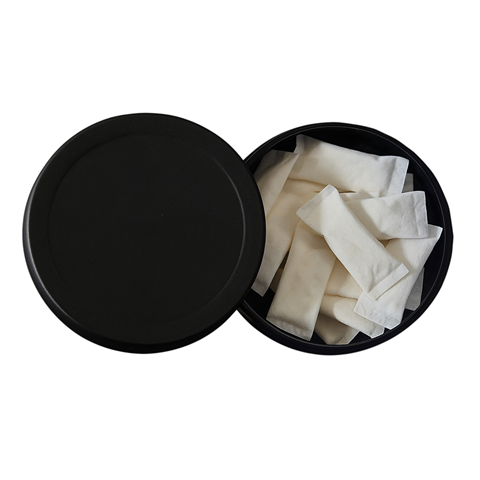Caffeine pouches are easily available and pose a number of risks for youth and children - Ellie Willcock unpacks this latest fad

I, for one, have never been a coffee drinker. As a former university student, many people would ask how I managed without it.
These days, it seems that no matter which café I visit, there’s almost always a 12-year-old sitting there with a coffee—usually a frappuccino or something equally sugar-filled and topped with cream and syrup. It’s something bound to give them a short energy boost… followed by an inevitable sugar crash.
this appeals to many people. It’s cheaper than a cup of coffee, carries none of the health warnings of smoking or energy drinks
A new trend that raises some concerns is the use of caffeine pouches. For as little as £10, you can buy a pack of 15. These pouches, which look like sticks of gum, are placed between the lip and gum, slowly releasing caffeine into the bloodstream over the course of an hour. They offer a sustained energy kick lasting between two to five hours. Caffeine works by blocking the receptors in your brain that detect adenosine—the chemical that makes you feel tired—allowing you to push through for longer.
Naturally, this appeals to many people. It’s cheaper than a cup of coffee, carries none of the health warnings of smoking or energy drinks, and is still legal, with few regulations due to how new it is.
But that doesn’t mean it’s harmless.
Doctors are beginning to raise alarms over potential side effects, including receding gums and caffeine dependency. For teens and children, the appeal of staying awake for a late-night game or being more alert during an exam can quickly lead to addiction. And while they may feel more productive at first, caffeine use can disrupt sleep cycles, making them even more tired the next day—and thus more dependent on the next “fix.” It becomes a never-ending cycle.
We all think we’re invincible… until we realise we’re not
There are deeper consequences, too. Caffeine stimulates the cardiovascular system—your heartbeat quickens, your body expects movement. The short-term effects can include anxiety, headaches, irritability, and mood swings. For young people, whose bodies and minds are still developing, the impact can be even more intense: insomnia, restlessness, and emotional instability.
As a parent, you likely won’t be encouraging your children to follow peer pressure or TikTok trends. But guiding them to make informed, values-based decisions is not always straightforward.
Through all of this, the only clear “benefit” of caffeine pouches is the temporary boost in energy. Yet that very same energy can be encouraged naturally—through proper sleep, healthy eating, and balanced routines.
I remember, during my time as a nanny, one of the children came downstairs still 86% asleep. He couldn’t understand why he felt so tired—until he admitted he’d stayed up past midnight watching a new show. Unsurprisingly, after school he was still completely out of it and fell asleep on the sofa.
This isn’t about banning every new thing, or debating what’s technically legal. It’s about guiding children to see how their choices affect their bodies, minds, and faith
The next day, we had a chat. I told him I’d done the same thing at his age, sneaking in one too many races on my Nintendo DS playing Mario Kart. My parents eventually told me they’d take it away if I used it on school nights again.
My point wasn’t to judge him—or to say I approved. It was to show that we all test limits. We all think we’re invincible… until we realise we’re not.
We’re called to help our children grow in wisdom. The physical and mental impact of caffeine has a spiritual dimension too. In 1 Corinthians 6:19–20, we’re reminded that our bodies are temples of the Holy Spirit, and we are to honour God with them. How can we do that if we’re regularly putting substances into our bodies that push us past our limits and encourage dependency?
Read more:
Nicotine pouches might not be as bad as smoking, but Christian parents need to know about this new fad on the street
4 ways Christian parents can engage with the latest TikTok trend: Aura farming
When our youth and children are overwhelmed and exhausted, do they turn to a caffeine pouch—or to God? Do they learn to build discipline and endurance, or do they learn to reach for a quick fix instead?
Teaching discernment and spiritual awareness in everyday choices—yes, even something as small as caffeine! - is part of how we raise children who think and act wisely. Romans 12:2 calls us not to conform to the patterns of this world. God doesn’t promise us ease, but he does promise to be with us through the hard parts. He can heal our bodies and soothe our minds—if we teach our children to seek him first.
By being vigilant, not fearful, we can help them resist the lure of “easy” fixes. This isn’t about banning every new thing, or debating what’s technically legal. It’s about guiding children to see how their choices affect their bodies, minds, and faith—and how they can live in a way that is both healthy and holy.


































